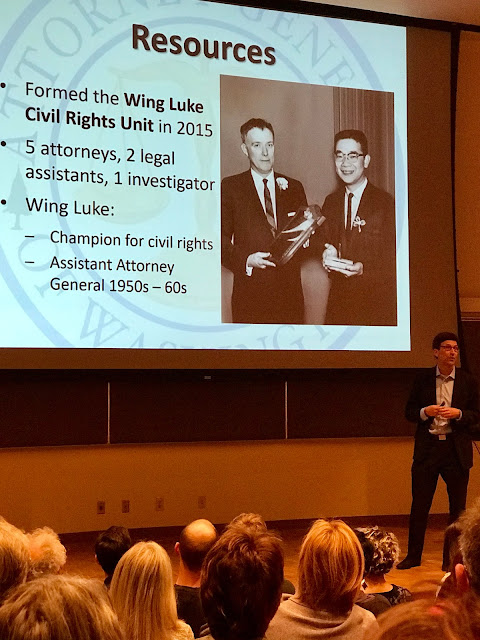Challenging the President
Friday the 13th was anything but bad luck for the 150+ students, faculty and public who packed Olin Hall auditorium on the Whitman College campus to hear the mid-morning address by Washington state Attorney General Bob Ferguson. He has made himself known not only statewide but also nationally by his dogged determination to protect the people of Washington against powerful interests that don't play by the rules; most recently Trump's Travel Ban and DACA.
Ferguson is a fourth generation Washingtonian who after a "gap year" of becoming a professional chess player, allayed his parents fears and ultimately graduated from the University of Washington and New York University law school. He and his wife are proud parents of 10-year-old boy and girl twins who clearly keep him grounded despite his highly demanding job.
While this slide was the last in his address, it is the golden thread that he wove throughout his hour-long speech and question/answer session.
So far in the Trump tenure, Ferguson has been involved in 24 federal cases on behalf of citizens of the state of Washington.
As Washington state Attorney General, Ferguson explained his three-point litmus test he uses to determine if an action is appropriate to bring a lawsuit.
Ferguson was not shy about giving copious credit to the team of lawyers he has assembled, the first being Noah Purcell, the Solicitor General. It was Purcell who successfully argued the plaintiff's case before the 9th Circuit Court of Appeals in the lawsuit over President Donald Trump's immigration executive order, aka the travel ban.
As recently as 2015, Attorney General Ferguson created a heretofore missing Civil Rights unit, named after Wing Luke who was a champion for civil rights. This newly formed unit works to protect the civil rights of everyone in Washington. The Attorney General enforces state and federal laws including discrimination of Washington citizens. To think there was never such a unit before 2015 to protect civil rights is hard to imagine.
Along with Ferguson on the left, these are the other members of the team who he gives credit for working tirelessly in January 2017 after Trump signed his executive order barring citizens from seven-Muslim-majority countries.
According to Ferguson, the process of gathering information and preparing to file a motion usually takes 2-3 weeks. But this team along with Noah Purcell accomplished it in three days, just in time to file on the first business day after Trump's pronouncement.
The audience later learned this is one of Ferguson's modus operandi--to anticipate an action, be organized, and be prepared to file by the next business day.
Using this photo of a game of chess with his twins as an anaology, Ferguson explained how preparing to file or argue a case is like playing chess: you must not only anticipate your own moves as well as those of your opponent, you must also consider the risk of each move.
Some chess players (and attorneys general) fail to think far enough ahead and instead choose to play it safe; whereas, he prefers to think as far ahead as he can and is comfortable in taking calculated risks. While acknowledging that no attorney can win every case, he attributes his success rate to this strategy.
There was a risk in filing against the travel ban alone, but Ferguson's team did it, and won.
The Department of Justice argued the the President should have "unreviewable authority," whereas the Washington state Attorney General's office argued there are limits to presidential authority.
In September 2017, Ferguson also filed a complaint against President Trump's executive order to rescind DACA. In yet another family-related anecdote, Ferguson told how his daughter asked one evening when he was busy writing letters what he was doing. His response was this: "The President did a bad thing, and I'm trying to fix it." Then later, she noticed the letter below. Clearly it was from a child, and after reading the letter herself, she asked if she, too, could respond.
Not to lose the teachable moment, Ferguson agreed, and from then on his daughter Katie added her own words and pictures to her father's replies to the letters of children, as seen here in the lower left.
In a question/answer session following his address, Ferguson replied to a question about the qualities he looks for when hiring staff. His answer revealed much about his character.
In his anecdotal style, he told the story of how in his own early employment, he often felt he was capable of more than what his supervisor(s) saw in him. This translates into his openness to look for the potential in people rather than limit them simply because they haven't done it before. That said, he does look for candidates who are hard workers, smart, and are able to think creatively. He also added that sheer perseverance and a strong work ethic make the difference.
* * * * *
In these politically and socially trying times, I must say I left Bob Ferguson's address with a sense of gratitude combined with good fortune that I live in Washington state. He is fighting the good fight for all people in the state.




































